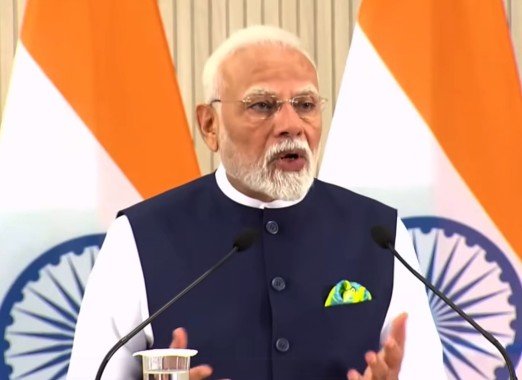Saptrishi Soni: India has chosen a cautious and independent diplomatic path in the wake of the Shanghai Cooperation Organisation’s unified condemnation of Israeli airstrikes on Iranian territory. While the influential Eurasian bloc issued a statement strongly criticising Israel’s recent military actions and warning of violations of international law, India refrained from associating itself with that declaration, signaling the complexity of its strategic imperatives in an increasingly polarized geopolitical climate.
As the violent confrontation between Israel and Iran intensifies, drawing in condemnation and concern from major global actors, India’s response has stood apart. The latest round of fighting, triggered by an Israeli military campaign targeting Iran’s military and nuclear sites, has stirred fears of a regional conflagration. In contrast to the sharper rhetoric from other members of the bloc, India has issued carefully worded messages calling for restraint, de-escalation, and dialogue, without assigning direct blame to either side. This distancing from the SCO’s official line appears deliberate and rooted in India’s unique diplomatic calculus.
India’s engagement with both nations goes far beyond routine diplomatic exchanges. It has long-standing defense ties with Israel, being one of the largest buyers of its military hardware. In recent years, Indian defense manufacturers have deepened collaborations with Israeli companies, and weapons supplies have continued even during periods of heightened conflict in the region. Simultaneously, India has cultivated a substantial economic relationship with Iran, most notably through its continued investment in the Chabahar Port project, a critical link to Afghanistan and Central Asia, bypassing rival routes.
These competing relationships present a strategic conundrum. The regional instability threatens India’s energy interests, trade corridors, and wider foreign policy goals, including its aspirations to play a larger role in Eurasian connectivity and security. As a member of the SCO, a grouping increasingly shaped by the influence of Beijing and Moscow, India’s independent line—one that neither condemns nor condones—is indicative of its broader non-alignment principle, now reinterpreted as strategic autonomy.
Delhi’s balancing act is more than symbolic. At a time when global alignments are hardening, India continues to walk the middle path, seeking to maintain operational ties with both Tel Aviv and Tehran without compromising its own regional or security priorities. Official communications have focused on appeals for diplomacy and peaceful resolution, with Indian leadership reiterating its concern for the evolving security environment while avoiding inflammatory statements. India has also clarified that it was not a party to the discussions that led to the SCO’s condemnation, further affirming its independent stance on the matter.
This calibrated response, however, has not gone unnoticed. International observers have remarked on the diplomatic friction this may cause within multilateral forums, particularly where Iran holds growing influence. Yet, India appears prepared to absorb that discomfort to preserve its sovereign policy orientation and strategic flexibility.
As the geopolitical dust continues to swirl across West Asia, India’s measured tone reflects its ambition to rise as a responsible global power, one that does not let alliances dictate its choices. Instead, it signals an intent to navigate turbulent waters with maturity, pragmatism, and a keen awareness of its national interests. In doing so, India reinforces its position as a nation capable of engaging across divides—even in moments of intensifying global discord.
#IndiaMiddleEastPolicy #IsraelIranConflict #SCO2025 #StrategicAutonomy #ChabaharPort #GlobalDiplomacy #IndiaIsraelTies #WestAsiaTensions
This is an auto web-generated news web story.





